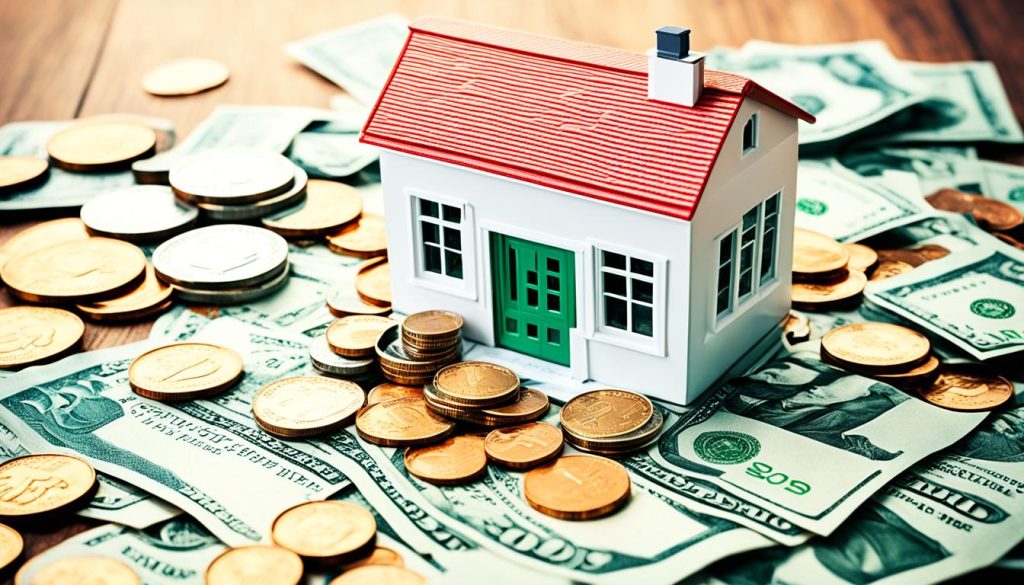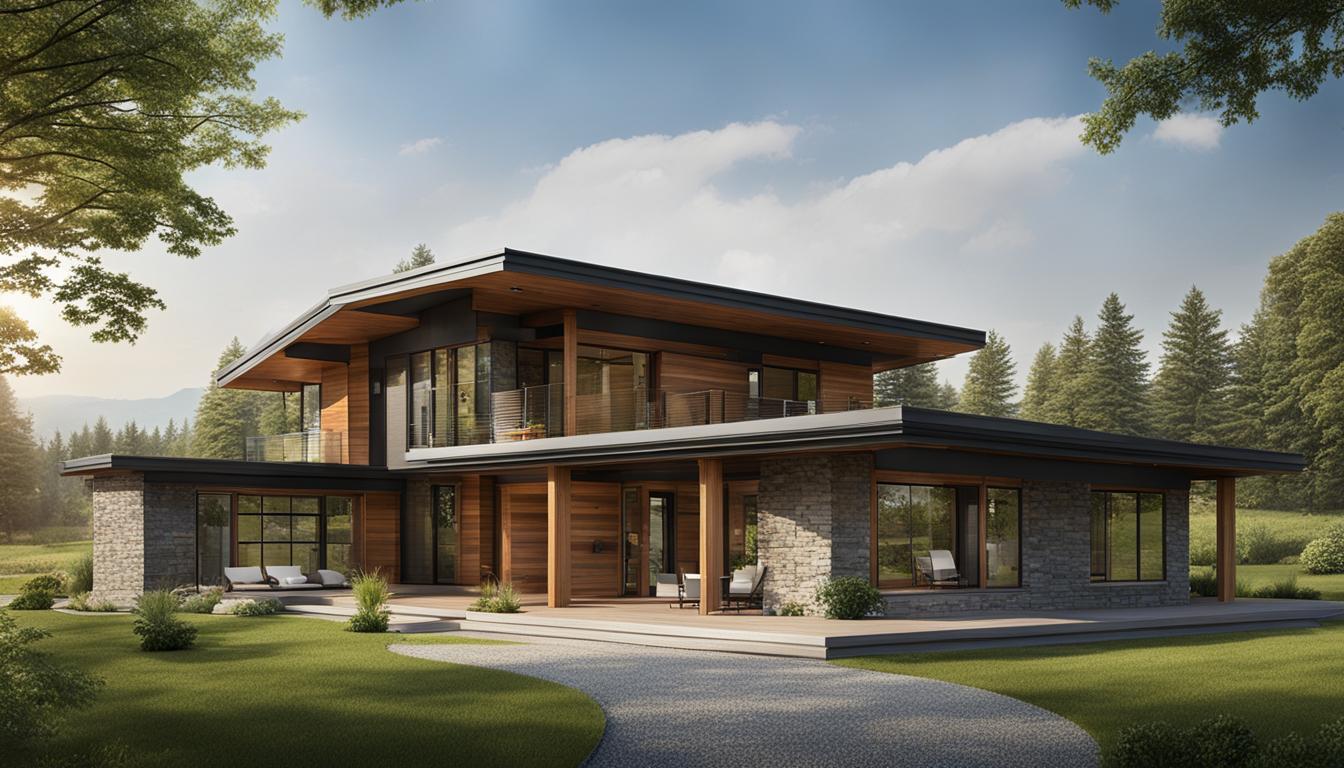Did you know that modular homes, also known as prefabricated homes, are gaining popularity across Canada? In fact, according to a recent study, the modular home market in Canada is projected to grow at a compound annual growth rate of 6.2% between 2021 and 2026. This indicates a significant shift in the housing industry as more homebuyers recognize the benefits of modular homes, such as cost-effectiveness and efficient construction processes.
In this comprehensive guide, I will walk you through the process of buying a modular home. Whether you’re a first-time homebuyer or looking to downsize, I’ll provide you with all the information you need to make a knowledgeable decision. From financing options to selecting the right manufacturer, we’ll cover everything to ensure a smooth and successful home-buying experience.
Key Takeaways:
- Modular homes are growing in popularity in Canada.
- The modular home market is projected to grow at a compound annual growth rate of 6.2% between 2021 and 2026.
- This guide will provide comprehensive information on how to buy a modular home.
- We’ll cover financing options, selecting the right manufacturer, and more.
- Make an informed decision and enjoy the benefits of a modular home!
Benefits of Buying a Modular Home
Modular homes offer numerous benefits to homebuyers. Whether you’re a first-time buyer or looking to downsize, modular homes provide cost-effective, high-quality construction, quick move-in options, and the convenience of modern living in a smaller space.
Cost-Effective
One of the significant advantages of purchasing a modular home is its cost-effectiveness. Modular homes are built using an efficient construction process and benefit from bulk purchasing of materials, resulting in lower costs compared to traditional homes. This affordability allows you to get more value for your money and potentially allocate your savings to other aspects of homeownership or personal goals.
High-Quality Construction
Contrary to popular misconceptions, modular homes are not compromised in terms of construction quality. In fact, modular homes offer high-quality standards and meticulous craftsmanship. The construction process takes place in a controlled factory environment, ensuring consistent precision and attention to detail. By eliminating weather-related delays and utilizing stringent quality control measures, modular homes provide a cleaner and more structurally sound final product.
Quick Move-In Options
One of the significant advantages of modular homes is their quick move-in options. Traditional stick-built homes can take several months to complete, from breaking ground to finishing the interior. In contrast, modular homes can be ready for move-in within a few weeks, thanks to the streamlined construction process. This quick turnaround time is especially beneficial for first-time homebuyers who are eager to settle into their new homes without enduring an extended waiting period.
Downsizing Made Easy
Modular homes are an excellent option for those looking to downsize without sacrificing the conveniences of modern living. These homes offer well-designed layouts that maximize the use of space while providing all the necessary amenities. From open floor plans to clever storage solutions, modular homes offer a comfortable and stylish living environment while accommodating the desire for a smaller footprint. Downsizing to a modular home allows you to simplify your life and enjoy a more manageable and cost-effective living space.
| Benefits of Buying a Modular Home |
|---|
| Cost-Effective |
| High-Quality Construction |
| Quick Move-In Options |
| Downsizing Made Easy |
Financing Options for Modular Homes
When it comes to financing a modular home, you have a range of options available to suit your financial needs. Whether you’re considering construction loans, mortgages from banks, or personal loans, understanding the different financing options is crucial in making an informed decision.
Construction Loans:
If you’re planning to build a modular home, construction loans are a common choice. These loans provide you with the funds needed to cover the construction costs, and they can be easily converted into an end loan once your home is complete. This option allows you to have flexibility during the construction process and simplifies the transition to a conventional mortgage.
Mortgages:
Similar to traditional homes, modular homes can be financed through mortgages offered by banks. This option provides you with the opportunity to spread out your payments over an extended period, making homeownership more affordable. It’s advisable to compare mortgage options from different lenders to find the best interest rates and terms that suit your needs.
Personal Loans:
If you prefer more flexibility or have specific financing requirements, personal loans can be a viable option. Personal loans are typically smaller in amount and can be obtained from various lenders, such as credit unions or online lenders. However, keep in mind that personal loans usually come with higher interest rates compared to construction loans or mortgages.
Additionally, government-backed loans such as USDA, VA, or FHA loans can also be used to finance modular homes. These loans often offer favorable terms and may require lower down payments, making them attractive options to explore.
When evaluating financing options, consider factors such as down payments, interest rates, and the duration of the loan. It’s crucial to select the option that aligns with your financial goals and allows for comfortable monthly payments.
Financing Options Comparison
| Financing Option | Key Features | Down Payment | Interest Rates | Loan Duration |
|---|---|---|---|---|
| Construction Loans | Funds construction costs, easy conversion to end loan | Varies | Competitive | Flexible |
| Mortgages | Spread out payments over an extended period | Typically require down payment | Varies based on lender | 15-30 years |
| Personal Loans | Flexible for specific financing requirements | Varies based on lender | Higher interest rates | Shorter-term |
| Government-backed Loans | Favorable terms, lower down payments | Varies based on loan program | Competitive | 15-30 years |

Step-by-Step Guide to Buying a Modular Home
To buy a modular home, you need to follow specific steps. Here is a comprehensive guide to help you navigate the process smoothly:
- Set a Budget and Determine Financing Options: Start by assessing your financial situation and setting a realistic budget for your modular home. Consider your financing options, such as construction loans, mortgages, or personal loans, and determine the best fit for your needs.
- Finding a Location: Choose a suitable location for your modular home. Consider factors such as proximity to amenities, schools, and transportation. Ensure the location meets your lifestyle requirements and adheres to local zoning regulations.
- Selecting a Manufacturer: Research and select a reputable modular home manufacturer. Look for manufacturers with a strong track record, positive customer reviews, and a range of customizable options. Take the time to visit model homes and tour manufacturing facilities to ensure the quality and craftsmanship meet your expectations.
- Preparing the Lot: Before the installation of your modular home, it’s crucial to prepare the lot. Ensure the site is level and well-drained, and check for any necessary permits or utility connections. Properly preparing the lot will ensure a smooth and efficient installation process.

Insuring Your Modular Home: It’s essential to secure insurance coverage for your modular home before it is delivered to the site. Consult with insurance providers to find the best policy that offers comprehensive protection for your investment.
Schedule Delivery and Installation: Coordinate with your modular home manufacturer to schedule the delivery and installation of your home. Ensure all necessary permits and approvals are obtained, and communicate any specific requirements or preferences for the installation process.
Complete Necessary Finishing Touches: Once the modular home is installed, you may need to complete some finishing touches, such as connecting utilities, landscaping, or interior customization. Take the time to finalize these details before moving into your new modular home.
Pros and Cons of Buying a Modular Home
| Pros | Cons |
|---|---|
| Cost-effective compared to traditional homes | Limited design and customization options |
| Quality construction in a controlled factory environment | Potential transportation and installation challenges |
| Shorter construction time and quicker move-in | May have limited financing options |
| Energy-efficient and environmentally friendly | Resale value might be lower compared to traditional homes |
Choosing the Right Modular Home Manufacturer
When it comes to building your dream modular home, selecting the right manufacturer is of utmost importance. A reputable modular home manufacturer can make all the difference in ensuring a smooth and successful home-building experience. To make the best decision, there are several factors to consider.
First and foremost, look for a modular home manufacturer with a solid reputation and extensive experience in the industry. A manufacturer with a good track record is more likely to deliver a high-quality home that meets your expectations. Reading customer reviews and testimonials can provide valuable insights into their past performance.
Another important consideration is the level of customization options offered by the manufacturer. Every homeowner has unique preferences and design ideas, so it’s essential to choose a manufacturer that can accommodate your specific requirements. Whether it’s custom floor plans, architectural styles, or interior finishes, the ability to personalize your modular home is crucial in creating the home of your dreams.
Lastly, take a close look at the warranty offerings of each modular home manufacturer you are considering. A comprehensive warranty provides peace of mind and ensures that any potential issues with your home will be addressed. Compare the warranties offered by different manufacturers and choose the one that offers the best coverage and protection.

Leave a Reply
You must be logged in to post a comment.